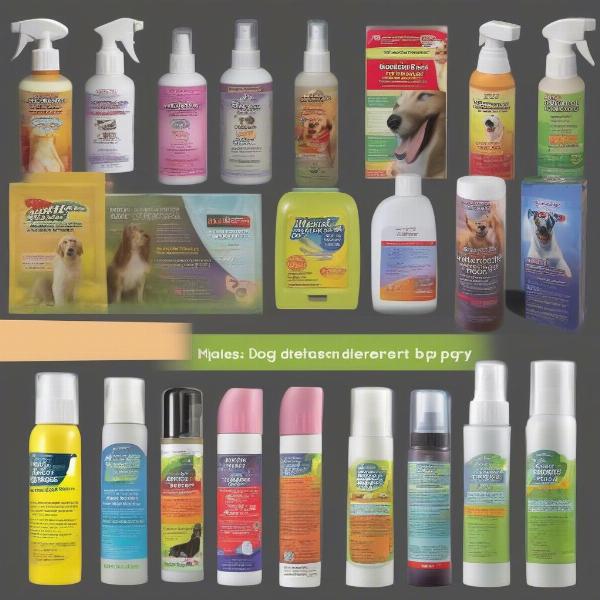Spray to stop dogs chewing can be a helpful tool in your training arsenal, but it’s essential to understand how these sprays work, when to use them, and what alternatives exist. Choosing the right product and implementing it effectively can save your furniture and belongings from destruction while ensuring your furry friend’s safety and well-being. This guide will cover everything you need to know about using anti-chew sprays, from choosing the right product to understanding your dog’s chewing behavior.
Understanding Why Dogs Chew
Before reaching for a spray to stop dogs chewing, it’s crucial to understand why your dog is chewing in the first place. Puppies chew to relieve teething discomfort, while adult dogs might chew due to boredom, anxiety, or excess energy. Some breeds are naturally more prone to chewing than others. Identifying the root cause can help you address the issue more effectively. Is it a behavioral issue, or are they simply lacking appropriate chew toys?
Choosing the Right Spray to Stop Dogs Chewing
Not all sprays are created equal. Some contain bitterants designed to deter chewing, while others utilize natural ingredients like citrus or peppermint oil. Look for products that are specifically formulated for dogs and avoid those containing harmful chemicals. Always check the ingredient list and ensure it’s safe for your dog’s age and breed. Consult with your veterinarian if you have any concerns.
 Different types of dog chew sprays
Different types of dog chew sprays
How to Use Dog Chew Deterrent Sprays Effectively
Apply the spray to the items your dog is targeting, following the manufacturer’s instructions. Be consistent with application, especially after cleaning or if the item gets wet. Introduce alternative chew toys and praise your dog when they choose these over the sprayed items. Remember, the spray is a deterrent, not a magic solution. It should be used in conjunction with training and providing appropriate outlets for your dog’s chewing instincts.
Homemade Spray to Stop Dogs Chewing
If you prefer a natural approach, you can make your own dog chew deterrent spray. A simple recipe combines water, white vinegar, and a few drops of citrus essential oil. Always test a small area first to ensure it doesn’t stain or damage the material. Remember, some essential oils can be toxic to dogs, so always research thoroughly before using them. Citrus oils are generally considered safe when diluted properly.
Alternatives to Sprays
Sprays are just one tool in the toolbox. Providing plenty of appropriate chew toys, engaging your dog in regular exercise, and addressing underlying anxiety or boredom can be equally important. Consider puzzle toys, interactive games, and training sessions to keep your dog mentally and physically stimulated.
What if My Dog Continues to Chew?
If your dog continues to chew despite using deterrents, it’s essential to consult with a veterinarian or a certified professional dog trainer. They can help identify any underlying behavioral or medical issues contributing to the chewing and develop a tailored training plan.
Conclusion
Using a spray to stop dogs chewing can be an effective part of a broader training strategy. By understanding the reasons behind your dog’s chewing behavior and combining the use of deterrents with positive reinforcement and appropriate alternatives, you can create a harmonious environment for both you and your furry friend. Remember, patience and consistency are key to success.
FAQ
- Is spray to stop dogs chewing safe? Most commercially available sprays are safe when used as directed. Always check the ingredients and consult with your vet if you have any concerns.
- What is the best spray to stop dogs chewing? The best spray depends on your dog’s individual preferences and sensitivities. Experiment with different products to find one that works for you.
- Can I make my own dog chew deterrent spray? Yes, you can make a homemade spray using natural ingredients like vinegar and citrus oils.
- What should I do if my dog licks the spray? While most sprays are designed to be non-toxic, it’s best to discourage licking. Monitor your dog and contact your vet if you notice any adverse reactions.
- Will the spray damage my furniture? Always test the spray on a small, inconspicuous area first to ensure it doesn’t stain or damage the material.
- What if the spray doesn’t work? If the spray is ineffective, consider other strategies like providing more chew toys, increasing exercise, or consulting a professional dog trainer.
- How long does it take for the spray to work? The effectiveness of the spray can vary. Be patient and consistent with application and training.
Related Articles
spray to stop dogs chewing furniture
stop chewing spray for dogs
homemade spray to stop dogs from chewing
About ILM Dog
ILM Dog is your one-stop resource for expert advice on all aspects of dog care, from breed selection to health, training, nutrition, and grooming. We offer practical tips and insights to help you provide the best possible care for your canine companion. We are committed to providing dog owners with reliable information and resources to ensure their dogs live long, healthy, and happy lives. For any inquiries or to learn more about our services, please contact us via email at [email protected] or phone at +44 20-3965-8624.